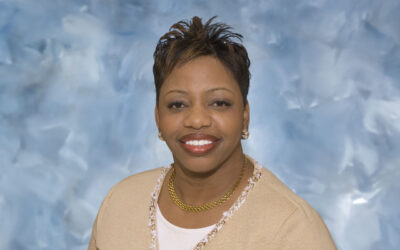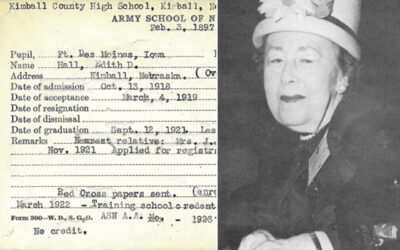By Matt Skoufalos

Critical Care Nephrology Nurse Practitioner Theresa Mottes has worked in the nursing field since she was 20 years old. In that time, she’s gone from a high school graduate to become a leader in her field and a nursing advocate in her chosen specialization of pediatric nephrology. Mottes credits a supportive professional environment with helping clear the path for her to achieve these things, but it was her determination and studiousness that put her where she is today.
Nursing was “what I was always going to do,” Mottes remembers, and her first job in pediatrics opened the door to a 25-year career at C.S. Mott Children’s Hospital in Ann Arbor, Michigan. (Today, she works at Texas Children’s Hospital in Houston, Texas.)
“I just kept getting opportunities to expand what I do and learn something new,” Mottes said. “I was a young mother, I had a family, and staying in the area was really important to us while raising our family.”
“From there, I just had incredible opportunities to start a career and move around a little bit,” she said.
Although she put down firm roots early in her career, Mottes points out that “nursing is never stagnant.” From opportunities to relocate, to shifting specialties, to continuing her education, “the nursing brain” led Mottes through a career that has been varied considering the bulk of it was spent within a single health system.
She started as a pediatric nurse on a floor of school-aged patients in the late 1980s. At that time, the hospital hadn’t established diagnosis-based floors, and the generalized care she provided there taught her how to treat patients dealing with everything from asthma to renal failure. Mottes thought she might enter the transplant program at the facility, but then discovered “one of my two loves,” which was critical care.
“It was always changing; I loved it,” she said. “I was exposed to a continuous form of dialysis while I was in the ICU, and became the lead for that program.”

Critical Care Nephrology Nurse Practitioner Theresa Mottes has worked in the nursing field since she was 20 years old.
Mottes enjoyed the critical care environment and the technical aspects of providing dialysis care, but the idea of getting to know her patients on a routine basis was an unexpected perk. Treatments brought the same patients under her care about four to five times a week, and Mottes began to know them better, “really becoming a part of their lives and watching them grow,” she remembers.
As roles within the institution began to change, she was invited to manage the entire pediatric dialysis program; when acute care split from chronic care, she became the director of that section.
“There were just opportunities happening, and when they worked out for me, I just took advantage of them,” Mottes said. “I was surrounded by incredible leaders from the pediatric dialysis world – some of the godfathers of some of the therapies – and that was an opportunity alone. They gave me opportunities to learn.”
Among them was pediatric nephrologist Timothy Bunchman, whom Mottes describes “as an innovative leader” inviting participation from the nurses in the program. Bunchman often “took a step back and said to the nurses, ‘Tell us what you think will work, and let’s try it,’ ” Mottes remembers.
“We were constantly being challenged to do it better, but we were given the support to do it,” she said. “It was never a stagnant environment.”
Furthermore, the association of C.S. Mott with the University of Michigan health system meant that nurses like Mottes were encouraged to write conference abstracts, to present papers, “and get out there in a supportive environment.” She said the positive workplace dynamic provided her the freedom to see the best in herself. It’s a hallmark of leadership she carries on today.
“Without that original support, I would not have had the courage I have to be able to speak in multiple different conferences and be a published author,” Mottes said. “I certainly credit those early days with laying that foundation that I just stepped onto and continued going.”
Critically, Mottes said she and her coworkers “were never put down for stumbling.” Instead, when colleagues happened upon ideas for performance improvement, their suggestions were embraced rather than dismissed. By creating an attitude of continuous improvement, the feeling that “there was always room to do it a little bit better,” gave staff inspiration to exceed their current boundaries.
“We were always a team,” Mottes said. “I think that’s one of the things in this dynamic environment: success isn’t based on hierarchy. It’s about having a level playing field, and respecting what everybody brings to the table.”
Those lessons have never left her. Today, she’s president of the Nephrology Nursing Certification Commission (NNCC), a group she joined 12 years ago as a writer. NNCC is responsible for developing and executing the certification tests for all nephrology and dialysis technicians, and making sure that work reflects current best practices.
As a researcher, Mottes continues to improve her own skills – she’s currently pursuing a nurse practitioner degree – while she leads the next generation of nurses in the expansion of their abilities.
“One of the things I always tell younger nurses is, if someone is asking your opinion, always say ‘yes,’ and get involved, because you just don’t know where it’s going to take you,” Mottes said. “And then follow that with, ‘I’m going to need some guidance,’ but do it.”
“There’s so many moving parts in this field,” she said. “Whether it’s outpatient, whether it’s nephrology clinic, or acute dialysis, it’s very dynamic, and there’s so many moving parts. It requires a really strong multidisciplinary team to execute it well.”










